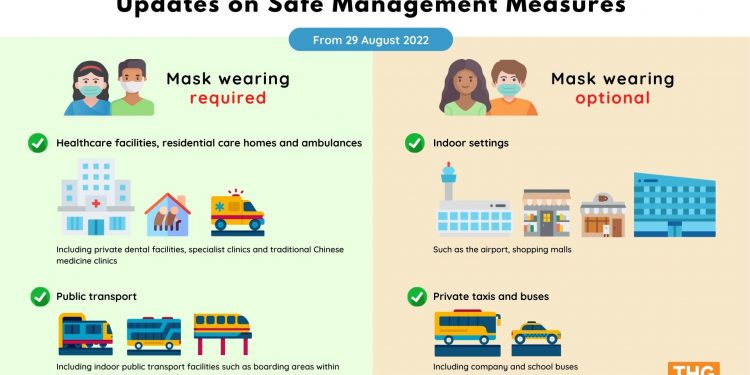It is masks off from Monday (29 Aug) — finally — after having worn one or more for 28 months since April 2020 when it first became mandatory during the Covid-19 pandemic.
The news was first announced by Prime Minister Lee Hsien Loong at the National Day Rally on Sunday (21 Aug), when he said, “With our situation stabilising, we will reduce the mask requirements further to prevent people from getting tired.”
Announcing the details at a media conference held by the Covid-19 multi-ministry task force, Deputy Prime Minister Lawrence Wong said on Wednesday (24 Aug) that masks will still have to be worn on public transport such as the MRT, LRT and public buses, as well as in indoor public transport facilities like boarding areas at bus interchanges and MRT platforms.
The dorning of masks are also mandatory in healthcare facilities, residential care homes and ambulances, including the indoor premises within hospitals and polyclinics.
Mask-wearing in the airport and on private transportation such as school buses, private bus services and taxis will be optional. The move will make Singapore one of the first countries in Asia to ease indoor mask-wearing. Currently, residents are only allowed to remove their masks outdoors.
This further easing of Covid-19 rules comes as the population has become more resilient against the virus, due to high vaccination rates and more people getting infected, the Health Ministry said. The number of infections has also declined steadily.
Even so, Mr Wong urged the elderly and those who are immunocompromised to continue wearing masks in crowded indoor settings to reduce their risk of catching the virus.
Mr Wong, who co-heads the multi-ministry task force, cautioned that while the pandemic situation has improved, Singaporeans must be mentally prepared for any sudden change as the next Covid-19 variant may be more aggressive and dangerous.
Health Minister Ong Ye Kung added that Singapore should prepare itself for a “northern hemisphere winter wave” at the end of the year, which the United States, United Kingdom and Europe are all bracing for.
Vaccination remains Singapore’s primary line of defence, said the Covid-19 multi-ministry task force.
Not fully-vaccinated travellers no longer need to be quarantined
From Monday, travellers who are not fully vaccinated will no longer need to serve a seven-day isolation period when they arrive, but they will still need to test negative two days before arriving in Singapore. They will have to take a polymerase chain reaction (PCR) test upon exiting stay home notice (SHN) but they will continue to need a negative pre-departure test taken within two days of departing for Singapore.
Join the conversations on TheHomeGround Asia’s Facebook and Instagram, and get the latest updates via Telegram.














